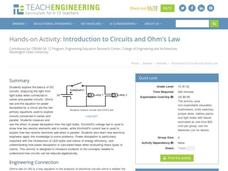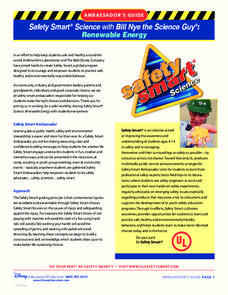Teach Engineering
Can You Resist This?
Some things are hard to resist. Small collaborative groups build circuits and calculate the voltage using Ohm's Law. Budding engineers explore the connection between the voltage across different resistors and linear functions with...
Teach Engineering
Introduction to Circuits and Ohm's Law
Take a very basic understanding of circuits and develop a strong understanding of the parts and function of a circuit. This activity is developed to be an independent exploration of circuits from the basics to series and parallel models....
Energy for Keeps
Renewable Energy Action Project: What's in Your Energy Portfolio?
Uncover the renewable energy potential in your region. The activity outlines an approach to research current practices and trends. Learners conduct surveys to assess the attitudes of the local population and prepare a paper summarizing...
NOAA
Oceans of Energy
Are the earth's oceans really just giant batteries, waiting for their energy to be harnessed? Middle school mechanical engineers will be shocked by the amazing amount of energy that forms around them after diving into part four of a...
Teach Engineering
The Grid
Upper graders form a "Presidential Task Force," and attempt to make recommendations concerning the future of the national power grid. After a teacher-led discussion which proves that our nation's energy consumption will soon outpace our...
Science Matters
Forms of Energy
The amount of energy Americans use doubles every 20 years. The first lesson in a 10-part series teaches scholars about different forms of energy. They rotate through five stations with hands-on activities or experiments at each in order...
Bonneville
Engaging with Solar Panels
Build a fan and become a fan of solar power. The second of 14 lessons in the Cost Effective Solar Cells unit has learners first construct circuits with solar cells to power a fan, a motor, and an LED. They then test their circuits both...
Bonneville
Variables Affecting Wind Turbine Power
Design the best from the best. Groups work together to come up with the best configuration of different variables that affect a wind turbine. The teams choose from several variables such as the number of blades, the angle of the blades,...
Bonneville
A Simple Circuit
Heat up a lesson on solar energy by building a circuit for a cooling fan. Given a solar module and a DC motor, scholars develop hypotheses for how to make the fan turn. They test out their hypotheses, and then draw a circuit diagram to...
Science Friday
Make a Speaker
Make science come in loud and clear. Pupils learn about how a speaker works by building one. The scholars first learn about electromagnetic fields by building an electromagnet. Using that knowledge, they build a crude speaker using a...
Disney
Renewable Energy
Bring some energy to your physical science curriculum with this engaging Bill Nye the Science Guy activity. Based on his Renewable Energy video, students explore the concepts of potential and kinetic energy and learn how they are applied...
Wind Wise Education
What is the Cost of Inefficiency?
What does it cost to keep the lights on? Through a hands-on activity, class members use a watt meter and determine the amount of energy different types of light bulbs use. The class then determines the financial and environmental cost of...
Mascil Project
Design and Build Your Own Vacuum Cleaner, Hair Dryer or Toy Car
No vacuum cleaner? No problem, just build your own. Scholars apply knowledge of currents to build a model of either a vacuum clear, a hair dryer, or a toy car. While the class completes the activity, instructors consider gender...
Bonneville
Introduction to Circuits
Light up the class's knowledge. Pupils build a simple circuit using a battery, wire, and a light bulb and create a diagram of their circuit. The teacher provides a short lecture on a complete circuit, calling attention to the direction...
Bonneville
Phone Charger Efficiency
Be efficient in learning about efficiency. A fun hands-on activity has pupils calculate the efficiency of cell phone chargers by measuring the power in and power out. They also learn how to read and use circuit diagrams.
Bonneville
Exploring Buck and Boost Converters
Boost one's knowledge of converters. The fourth of seven installments in the Off the Grid unit looks at buck and boost converters, which lower and raise the input voltage. Scholars apply the converters to adjust the output voltage to...
Bonneville
Macro-Scale Solar
There's no substitute for the power of the sun. The second of four installments of the Solar Resources Assessment unit looks at macro-scale photovoltaic (PV) technology. Future scientists first learn about PV modules with a PowerPoint...
WindWise Education
How Does a Generator Work?
I get a charge out of this. In order to learn how a generator works, groups build and test one in this ninth lesson of the series. The generators are tested at low speed and high speed to determine the watt output and whether they have...
K20 LEARN
Timmy Made Mistakes: Lab Safety
It's better to be safe than sorry ... just ask Timmy! Engage learners with a hilarious lab safety review activity. The lesson, part of the K20 series, revolves around identifying, describing, and remediating disastrous lab practices.
Science 4 Inquiry
Introducing the Types of Energy
Young scientists explore many different types of energy including light, heat, nuclear, sound, potential, and more. They match the types of energy and identify when energy transfers from one type to another.
Science Matters
Conductors and Insulators
Get that energy flowing while classes study conductors and insulators. Using a simple circuit, learners test different materials to determine the strength of conductivity. They use their results to classify materials as conductors or...
Science Matters
Series Circuit and Switches
Lights out! Scholars build on their understanding of a simple circuit by adding a switch and creating schematic drawings. The eighth lesson in a series of 14 has pupils use everyday materials to create circuits and make observations as...
Bonneville
Introduction to Energy
Transform the classroom with energy. Pupils learn about different types of energy and practice identifying the types in the first lesson of six in a solar versus wind energy unit. The class sees examples of how one type of energy can be...
Bonneville
Variables Affecting Solar Power
Determine the best energy generator. Groups play with a photovoltaic cell to determine the variables that affect its energy output. The teams investigate a variable to determine the optimum performance of the solar cell. Pupils compare...
Other popular searches
- Static Electricity
- Electricity and Magnetism
- Electricity Experiments
- Current Electricity
- Basic Electricity
- Science Static Electricity
- Science Electricity
- Basic Electricity Worksheets
- Electricity and Light Bulb
- Electricity Circuits
- Electricity Magnet
- Electricity Lesson Plans

























